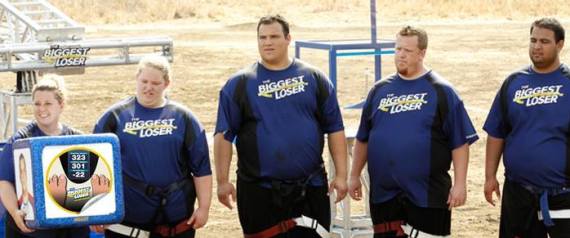“Biggest Loser” Versus Bariatric Surgery: Comparison

In the first part of the series, we looked at a recent study comparing results of weight loss with NBC’s “Biggest Loser” to weight loss with weight loss surgery. At least in the short term, weight loss was similar, with Biggest Loser contestants coming out ahead at 7 months with the gap narrowing by 12 months.
Some articles and research are available, but wouldn’t it be nice if there were a way to compare Biggest Loser and bariatric surgery side by side? Here’s our summary of how the groups lost weight and what the results were.
Methods
In case you’re not aware, the “Biggest Loser” is a reality television show that is a weight loss competition. Morbidly obese contestant compete on the Biggest Loser ranch to lose the most weight. Every 7 to 10 days for 13 weeks, a contestant is voted off and eliminated from the competition. From week 13 to 30, the remaining contestants go home and return for the finale, where the contestant who has lost the most weight is crowned the Biggest Loser winner. They lose weight with intense exercise and a restricted diet.
This study compared roux-en-Y gastric bypass (RYGB) patients. They lose weight because their smaller stomach forces them to eat smaller meals. In addition, they need to limit sweets and fatty foods to avoid gastrointestinal symptoms.
Diet
Biggest Loser contestants ate similar amounts of to RYGB patients. In the Biggest Loser, contestants ate at least 70 percent of their baseline needs, calculated by a formula based on their fat-free mass. A contestant who weighs 220 pounds and has 50 percent body fat would be asked to eat at least 1,000 calories per day. The diet includes lean protein, fruits, and vegetables, and restricts processed foods.
In comparison, RYGB patients often eat a similar number of calories. They too focus on protein, followed by vegetables and fruits. Also, they limit sugary and fatty processed foods.
Exercise
Here’s the big difference. Four hours of exercise a day, anyone? Biggest Loser contestants exercise 90 minutes per day six days a week with the trainers, plus up to 3 hours daily on their own. That adds up to up to 31.5 hours a week – basically a job!
Weight loss surgery patients are asked to exercise, but to work up to it. They may have goals such as working up to 20 or 30 minutes daily, and getting up to 60 to 90 minutes most days over the long run.
The Logistics: Support and Cost
Biggest Loser contestants have a lot of support. On the show, they see a trainer six days a week. They have a doctor – Dr. Huizenga – to monitor their health and progress. In contrast, most RYGB are on their own – they don’t have the luxury of a trainer each day. They tend to follow-up with their surgeon once or a few times over the months following surgery. They may have support groups to help.
Bariatric surgery is expensive, no question. The procedure, plus pre-op workups and post-op appointments, can be thousands or tens of thousands of dollars. Biggest Loser? Diet and exercise sound inexpensive, but can you afford to exercise for 31.5 hours a week? Can you afford to see a doctor whenever you want?
What about the cost of benefits provided to contestants, such as having room and board at a weight loss resort for several weeks? The list price for a guest at a Biggest Loser Resort is about $2,500 weekly. For 13 weeks, as on the Biggest Loser, that’s a cost of $32,500. Makes RYGB seem cheap!
Weight Loss
What about the important thing – weight loss? Turns out the results are pretty similar…at least in the beginning. After 7 months, the Biggest Loser group lost an average of 108 pounds, while RYGB patients were at an average of 78 pounds down. By 12 months, RYGB patients were down by 89 lb. on average. And Biggest Loser patients? They were no longer being followed – who knows what happened after their season of the show ended?
It stays a little cloudy later on, too. Biggest Loser hasn’t published statistics on the long-term success of its contestants. In contrast, RYGB has been shown to be successful in studies that have tracked patients for 5 or even 10 years.
Health Effects
Both groups had improvements in some measurements of health. Blood pressure, blood sugar, chronic inflammation, and “good” HDL cholesterol improved. Strangely enough, Biggest Loser contestants had an average increase of total cholesterol from 168 to 192, and of “bad” LDL cholesterol from 105 to 126.
Also curious was the decrease in metabolic rate – or the number of calories burned at rest. Biggest Loser contestants’ metabolisms dropped more the RYGB patients’, even though Biggest Loser contestants maintained more of their lean tissue while dropping more fat.
Okay, so what’s the take-home message? One might be that the way that is best for you to lose weight depends on your individual situation. If you have the time and money to train Biggest Loser-style, maybe you would prefer that to going under the knife. If you need a permanent tool for long-term assistance with losing weight, and maybe even if your health insurance will chip in, weight loss surgery may be for you. What do you think?
I'll take unrealistic ways to permanently keep off weight for $1000, Alex.
-Oh wait, that is a different Alex. ![]()
As much as I applaud the contestants for wanting to lose their excess body weight, the show is not realistic for the other 99.99999% (a made up number, but probably not too far off) of the population who need to lose weight and want to.
Very few of us can quit our jobs and pay that kind of money to have a dedicated personal trainer on a resort for that length of time.
We need to make lifestyle changes, I am sure many people (myself included) can attest to losing weight with a diet plan such as Weight Watchers, etc., just to gain it all back. We didn't make the lifetime commitment to keeping the weight off by exercising and eating differently.
I treat my VSG (which I am thankful to be able to afford, even though the insurance copay was appreciable) as a tool. I am aware there are physical changes (ghrelin and other hormonal along with malabsorption and/or restriction) among other changes associated with these procedures.
I need to take care of this tool, use it as it was intended, not abuse it or "let it rust" by not using it, just like any tool I have in my toolbox in my basement. That means that I need to eat in moderation, make healthy choices most of the time, exercise and consume enough Water and Protein on a daily basis, to name a few things.
I would like to see the long term success of these contestants.
They are ill-prepared for making this successful in the long run, but could possibly do so, if they follow the basic concepts.
Instead of humans quickly fattening up an animal for slaughter for their own prosperity, these are animals who market this show (by exploiting morbidly obese and desperate contestants under the guise of trying to help people) by thinning down quickly humans for their own prosperity.
That is why I don't watch the show. I am sure they are glad people are losing weight and becoming healthier, but how much effort do they put into the contestants to follow up with them and prepare them mentally and physically for their lives after the show when their usefulness is no longer needed?
Edited by 4MRB4PHOTO
Actually if you search you tube for Biggest Loser gastric sleeve there are a number of former BL contestants who are now sleevers
Can you post a link or two, please?
I've done various Google searches for "former Biggest Loser contestants" or some such and the results are, depressingly, what you might suspect: very many of them regain their weight. When they're at the ranch, food choices are made for them and, as noted, they're exercising a LOT. Maintaining that lifestyle isn't possible, so when they're back on their own . . .








Djmohr 6,965
Posted
Great article Alex! Some day maybe will get access to their long term maintenance as well. I suspect like most that many of these folks are unable to keep the weight off.
Thanks for sharing!
Share this comment
Link to comment
Share on other sites